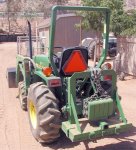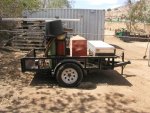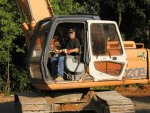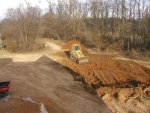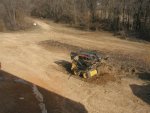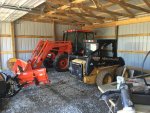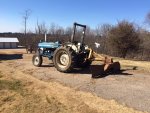I would not recommend hooking a tractor to something that doesn't want to move. One of the first things we learned about tractor use as kids is what happens when you do that. A lot of people have been hurt bad doing that. I sure wouldn't push something that didn't want to move with the front end loader of my tractor. Talk about potential expensive repairs.
I think gouging dirt, pushing and pulling on things that don't want to move is what bulldozers and heavy equipment are for
I grew up on a farm. I've been driving tractors since I could reach the pedals. I still have one. I've also operated heavy equipment. I have attached some pictures just for fun. I think the Excavator is a CASE 9020B. Working alone, as a kid, I used to use blocks and a chain fall to attach implements like cultivators and loaders to our Farmall 400 and Farmall M. Even as a kid I was pretty good with keeping things right side up and I was very careful. I still am.
The counterweight on the John Deere has a hitch slider on it. I would take the front end weights (stored on the counter weight when the loader is on the tractor) off before I used it to pull my welding trailer (also pictured).
Digging and moving dirt with a front end loader is common practice. I've done it for decades. Never broken a loader doing it. So is plowing ground, disking ground, tugging stone boats, pulling stumps, dragging logs, and moving other things that don't want to move. Tillage equipment doesn't want to move unless the tractor over powers it.
I've used my JD770 to pull small stumps. I have a seven hundred pound counter weight on the back of it when I use it with the loader on it. I run the chain under the counter weight to the draw bar. Fill the bucket with dirt. That thing can pull as hard as it wants. The wheels will spin before it does anything bad. Works great. It can't go over backwards because the chain is under the counter weight. Between the dirt in the bucket, 4WD, filled rear tires and the counter weight, it can pull really hard. I only do that on level ground.
Tractors, used improperly, are dangerous pretty much like anything else used improperly is dangerous. Especially little ones like the BX series and similar tractors by other manufacturers. They are narrow, the CG is high on them and the 4 wheel configuration gives a false illusion of stability. The three support points are the pivot up under the radiator and the contact points for the rear tires. That forms a triangle that angles up as it moves forward. If the load vector from the CG of the tractor falls outside that triangle due to gravity (operating on a slope that's too steep), or movement (corner too fast with a loader bucket raised), the tractor rolls with no warning. Unlike a car, or RTV, tractors don't have a suspension that gives a warning before they roll over. They just go.
Things that make the tractor less stable are things that move the CG up and/or forward. Forward moves the CG toward a location where the triangle is narrow so it takes less force to roll the tractor. A loader bucket full of dirt raised to full height, for example. Driving around a corner with the filled loader bucket raised. That's why I have the counter weight on my JD and the tires filled. It moves the CG back and down which radically increases stability when using the loader.
The neighbor who lived on the farm across the road from ours was killed in a tractor accident in 1962. The accident was caused by bad brakes. I know it was bad brakes because I'd driven that tractor. The brakes sucked. The tractor failed to stop, went down a steep bank in reverse, threw him off and rolled on him. It was a Farmall H. Another neighbor was badly hurt when he got the rear wheel on his H too close to the bank along the road in a field he'd tilled all his life. The tractor slipped down the back and rolled. It trapped him underneath. He survived but he was unable to work after that.
The message is pay attention and keep the machinery in good repair. If the brakes don't work, fix them before using it. Watch out for soft ground.
I've spent close to a thousand hours combined operating a CAT 953B, Case excavator, and D9H. I've seen a D9H rolled when a track crushed the edge of a bank. The operator got out of it uninjured.
The RTV wasn't designed to pull tillage implements. Will it do it? Yes, for a while. Is it hard on it? Yes. Will it last as long as a tractor designed to do that? No. Will some RTV's doing it last longer than others with out failing? Yes. Same for plowing snow. Does that mean it's a good idea? Not for me, but maybe others think it's a great idea.
Fitch

